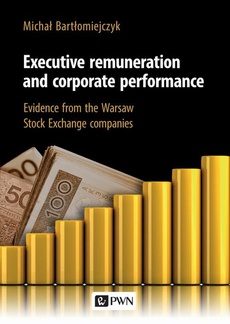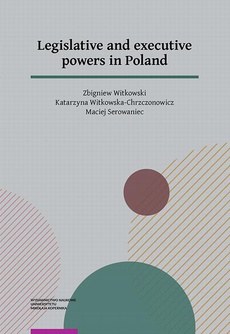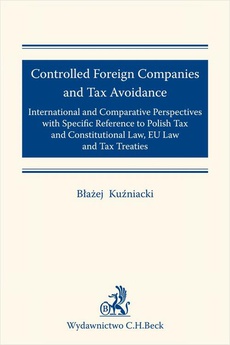POLECAMY
Executive remuneration and corporate performance
Evidence from the Warsaw Stock Exchange companies
Autor:
Wydawca:
Format:
epub, mobi
The topic of this monograph refers to the remuneration of executives and its relationship with corporate performance. The thesis provides the review of the compensation and corporate governance theories with the focus on the principal-agent theory, which describes the conflict of interests between shareholders and executives. It delivers a broad review of corporate governance models, and its control mechanisms. Executive remuneration is a motivational mechanism that should solve the agency problem by aligning incentives of the managers and the shareholders. The monograph involves the review of the structures of remuneration across selected countries, including Poland. It shows different performance measures and their correlations with the executive remuneration in the international studies.
The main objective of this monograph is to examine the relationship of executive remuneration of the companies listed on the Warsaw Stock Exchange (WSE), particularly the chief executing officer (CEO) total compensation and corporate performance, measured by the changes in market valuation. The hypothesis of this paper is:
The total CEO compensation has a positive relationship with firm performance measured by the stock valuation for non-financial companies listed on the Warsaw Stock Exchange.
This study is the first of such complexity in the area of executive remuneration in Poland.
Prof. dr hab. Maria Aluchna
An original study both on Polish and international scale. The author undertook a difficult task and performed it in a way that demonstrated his high competences.
Dr hab. Czesław Mesjasz, prof. UEK
The research problems raised in the monograph are important and current. Their cognitive value derives from the perennial attempts to identify and evaluate the relationship between top executive remuneration and the economic performance of companies. The application value of the monograph should also be emphasised. The results of research conducted on a sample of Polish public companes can provide interesting conclusions for legislative initiatives aimed at modifying existing and creating new corporate governance standards on the Polish capital market. In this context, any attempt to describe and evaluate the management remuneration policy deserves recognition.
Dr hab. Piotr Urbanek, prof. UŁ
Temat książki dotyczy wynagrodzeń kadry zarządczej i ich roli w wynikach przedsiębiorstwa. Zawiera ona przegląd teorii z tematyki wynagrodzeń oraz ładu korporacyjnego, ze szczególnym naciskiem na teorię agencji, która opisuje konflikt interesów pomiędzy udziałowcami a kadrą zarządczą. W pracy przedstawiony jest przegląd modeli ładu korporacyjnego, a także wewnętrznych i zewnętrznych mechanizmów kontrolnych. Wynagrodzenie kadry zarządczej pełni funkcję motywacyjnego mechanizmu kontrolnego, który powinien łagodzić skutki problemu agencji poprzez zbliżenie celów menadżerów i akcjonariuszy. Praca przedstawia różne struktury wynagrodzeń kadry zarządczej w wybranych krajach, w tym w Polsce. Zawiera ona także przegląd wskaźników mierzących wyniki przedsiębiorstwa oraz ich powiązania z wynagrodzeniem kadry zarządczej w ujęciu międzynarodowym.
Głównym celem książki jest zbadanie roli wynagrodzenia kadry zarządczej, zwłaszcza prezesów spółek notowanych na Giełdzie Papierów Wartościowych w Warszawie oraz identyfikacja związków pomiędzy wynagrodzeniem a wynikami przedsiębiorstw.
Hipoteza badawcza:
Całkowite wynagrodzenie prezesów jest pozytywnie powiązane z wynikami firmy, mierzonymi wyceną rynkową akcji dla spółek spoza sektora finansowego notowanych na Giełdzie Papierów Wartościowych w Warszawie.
Jest to pierwsze tak kompleksowe badanie wynagrodzeń kadry zarządzającej w Polsce.
Prof. dr hab. Maria Aluchna
Recenzowana rozprawa jest opracowaniem oryginalnym zarówno w skali krajowej, jak i w skali międzynarodowej. Autor podjął się trudnego zadania wykonał je w sposób świadczący o Jego wysokich kompetencjach.
Dr hab. Czesław Mesjasz, prof. UEK
Podjęta w monografii problematyka badawcza jest ważna i aktualna. Jej walory poznawcze związane są z podejmowanymi od wielu lat próbami identyfikacji i oceny zależności występujących między wynagrodzeniami naczelnej kadry kierowniczej a wynikami ekonomicznymi spółek. Należy też podkreślić walor aplikacyjny monografii. Wyniki badań prowadzonych na próbie polskich spółek publicznych mogą dostarczyć interesujących wniosków dla potrzeb inicjatyw legislacyjnych mających na celu modyfikację istniejących i tworzenie nowych standardów nadzoru korporacyjnego na polskim rynku kapitałowym. W tym kontekście każda próba opisu i oceny zjawiska, jakim jest polityka wynagradzania kadry kierowniczej zasługuje na uznanie.
Dr hab. Piotr Urbanek, prof. UŁ
| Rok wydania | 2020 |
|---|---|
| Liczba stron | 228 |
| Kategoria | Zarządzanie, organizacja, strategie |
| Wydawca | Wydawnictwo Naukowe PWN |
| ISBN-13 | 978-83-01-21147-9 |
| Numer wydania | 1 |
| Język publikacji | angielski |
| Informacja o sprzedawcy | ePWN sp. z o.o. |
Ciekawe propozycje
And Still I Cheat the Gallows
do koszyka
And the winner is...Model...
do koszyka
And Vice Versa
do koszyka
And Vice Versa
do koszyka
Spis treści
| Acknowledgments | 9 |
| Introduction | 11 |
| 1. Corporate governance and compensation theory 17 | |
| 1.1. Introduction | 17 |
| 1.2. Definition of corporate governance | 17 |
| 1.3. Compensation theory | 22 |
| 1.3.1. Reinforcement and expectancy theories | 22 |
| 1.3.2. Equity theories | 25 |
| 1.3.3. Agency theory | 28 |
| 1.3.4. Transaction cost theory and incomplete contracts theory | 34 |
| 1.3.5. Resource dependency theory | 36 |
| 1.3.6. Compensation theory summarised | 38 |
| 1.4. Corporate governance models | 39 |
| 1.4.1. Simple financial model | 39 |
| 1.4.2. Stewardship model | 40 |
| 1.4.3. Stakeholder model | 42 |
| 1.4.4. Political model | 44 |
| 1.4.5. Corporate governance models summarised | 46 |
| 1.5. Control mechanisms | 46 |
| 1.5.1. Internal control mechanisms | 47 |
| 1.5.2. External control mechanisms | 52 |
| 1.5.3. Motivational mechanisms | 56 |
| 1.6. Conclusions | 56 |
| 2. Corporate governance and executive remuneration:An international comparison 59 | |
| 2.1. Introduction | 59 |
| 2.2. Corporate governance models across selected countries | 59 |
| 2.2.1. Geographical taxonomy of corporate governance models | 59 |
| 2.2.2. Corporate governance in the United States | 61 |
| 2.2.3. Corporate governance in the United Kingdom | 64 |
| 2.2.4. Corporate governance in Germany | 66 |
| 2.2.5. Corporate governance in Poland | 69 |
| 2.3. Executive remuneration across selected countries | 72 |
| 2.3.1. Components of executive remuneration | 72 |
| 2.3.2. Executive remuneration in the United States | 74 |
| 2.3.3. Executive remuneration in the European Union | 85 |
| 2.3.4. Executive remuneration in Poland | 95 |
| 2.4. Conclusions | 100 |
| 3. Corporate performance and executive remuneration | 101 |
| 3.1. Introduction | 101 |
| 3.2. Factors of corporate performance | 101 |
| 3.2.1. Defining performance | 103 |
| 3.2.2. Internal performance factors | 105 |
| 3.2.3. External performance factors | 112 |
| 3.3. Determinants of executive remuneration | 114 |
| 3.3.1. The significance of determinants of executive remuneration | 114 |
| 3.3.2. Managerial labour market as a determinant of executive remuneration | 115 |
| 3.3.3. The role of the board of directors in executive remuneration | 117 |
| 3.3.4. Sales, profits, and total assets as determinants of executive remuneration | 119 |
| 3.3.5. Other determinants of executive remuneration | 122 |
| 3.4. The influence of executive compensation on performance | 123 |
| 3.5. Conclusions | 144 |
| 4. The influence of CEO compensation on performance of companies listed on the Warsaw Stock Exchange | 145 |
| 4.1. Introduction | 145 |
| 4.2. Hypothesis development | 145 |
| 4.3. Data Analysis | 147 |
| 4.3.1. Sources of Data | 147 |
| 4.3.2. Scope of data sample | 151 |
| 4.3.3. The breakdown of CEO remuneration | 152 |
| 4.4. Research method | 161 |
| 4.4.1. Tools used | 161 |
| 4.4.2. Variables | 161 |
| 4.5. Descriptive statistics | 173 |
| 4.6. Model | 176 |
| 4.7. Assessment of the quality of the model | 176 |
| 4.8. Results | 178 |
| 4.9. Discussion | 181 |
| Conclusions | 183 |
| Bibliography | 187 |
| List of tables | 197 |
| List of figures | 199 |
| List of equations | 201 |
| List of abbreviations | 203 |
| Tools used | 205 |
| Appendices | 211 |
| Appendix I: Regression results for t for 2011–2015 | 211 |
| Model Summary | 211 |
| Coefficients | 212 |
| Correlations with unstandardised residual | 214 |
| Appendix II: Regression results for t+1 for 2011–2015 | 216 |
| Model Summary | 216 |
| Coefficients | 216 |
| Correlations with unstandardised residual | 218 |
| Appendix III: Regression results for t+2 for 2011–2015 | 220 |
| Model Summary | 220 |
| Coefficients | 220 |
| Correlations with unstandardised residual | 222 |
| Appendix IV: Regression results for sample with state-owned companies excluded, 2011–2015 | 224 |
| Model Summary | 224 |
| Coefficients | 224 |
| Correlations with unstandardised residual | 226 |
| List of excluded companies | 228 |

























